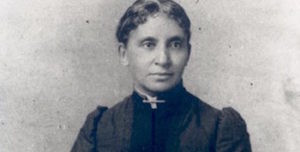
Charlotte Forten Grimke
*The birth of Charlotte Forten is celebrated on this date in 1837. She was a Black abolitionist and poet.
Charlotte Forten Grimke was from Philadelphia, Pennsylvania, and a prominent member of the Forten-Purvis family; activist for black causes and civil rights. Her parents were Robert Bridges and Mary Woods Forten. Her father and brother-in-law, Robert Purvis, were key members of the Philadelphia Vigilant Committee, an antislavery, slave assistance network. Her mother worked in the Philadelphia Female Anti-Slavery Society. Grimke's grandfather was James Forten Sr., a successful abolitionist and sailmaker in Philadelphia.
Grimke's father sent her to Salem to attend the Higginson Grammar School; in 1854, she was the only Black student out of 200. The Higginson school was known for its emphasis on critical thinking, founded on studying history, geography, drawing, and cartography. After Higginson, she attended the Normal School in Salem. She loved to read; her favorites were Shakespeare, Milton, Margaret Fuller, and William Wordsworth.
She became a member of the Salem Female Anti-Slavery Society, where she worked raising money, meeting with others, and hearing other prominent speakers and writers of the day, such as Ralph Waldo Emerson and Senator Charles Sumner. She also socialized with other famous anti-slavery proponents such as William Lloyd Garrison, editor of the Liberator; Wendell Phillips, the orator; and activists Maria Weston Chapman and William Wells Brown.
Grimke became a teacher in 1856 due to financial difficulties. She taught at Epes Grammar School in Salem, but after two years, tuberculosis forced her to return to Philadelphia. The school promised her a position upon her return. While in Salem, her poetry talent emerged, and her works were published in various antislavery publications such as the Liberator and Anglo-African magazine.
At home, she became the first Black teacher involved in the American Civil War's Sea Islands mission (The Port Royal Experiment). In South Carolina, she touched many students and thoroughly enjoyed her work. She chronicled this time in her essay, "Life on the Sea Islands," published in Atlantic Monthly in the May and June issues of 1864.
She held national influence recruiting teachers in the late 1860s, and on July 3, 1873, she became a clerk at the U.S. Treasury Department: she was one of 15 out of 200 candidates. She married Francis J. Grimke when she was 41, on December 19, 1878. He was a Presbyterian minister who graduated from Lincoln University in Pennsylvania and Princeton Theological Seminary. They had one daughter, Theodora Cornelia, in June of 1880, who died as an infant. She then aided her husband in his ministry and organized a women's missionary group. Her husband became pastor at the Fifteenth Street Presbyterian Church in Washington, D.C., where she continued her civil rights efforts.
Her last efforts were answering an Evangelist editorial, "Relations of Blacks and Whites: Is There a Color Line in New England?" Her answer asserted that unlike the assertions of the author that Blacks were not prejudiced against, Black America did achieve over extraordinary odds and wanted fair and respectful treatment. Charlotte Forten Grimke died in 1884.
Black Women in America
A Historical Encyclopedia
Volumes 1 and 2, edited by Darlene Clark Hine
Copyright 1993
Carlson Publishing Inc., Brooklyn, New York
ISBN 0-926019-61-9